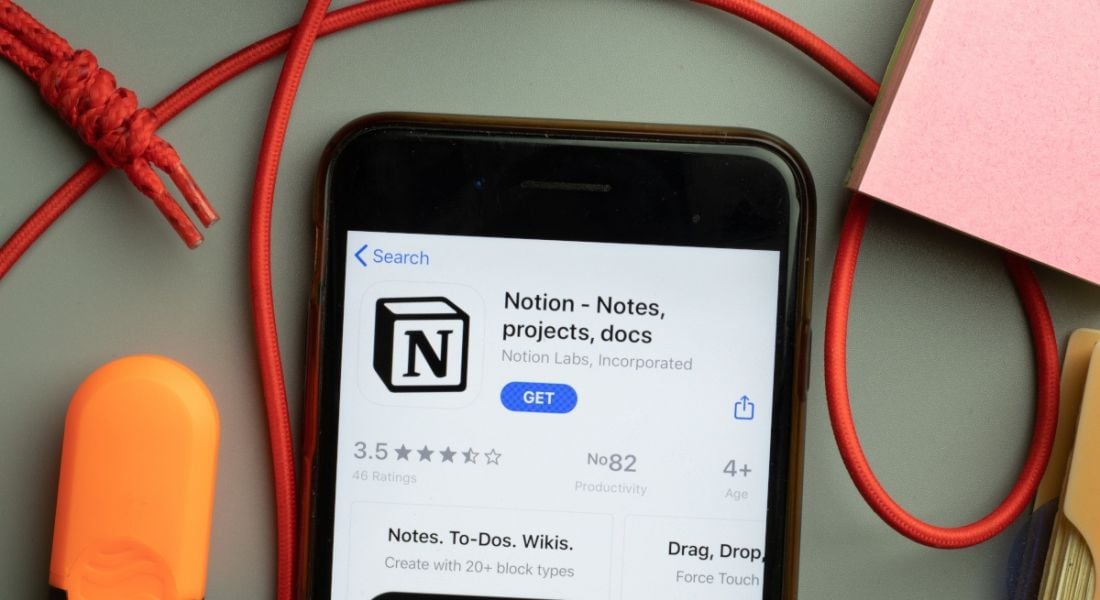Notion, which has its EMEA offices in Dublin, has a loyal following among productivity nerds. Here is a guide to get you acquainted.
It might not be as well-known in Ireland as some other productivity apps, but Notion is definitely worth trying out – especially if you want an alternative to the likes of Evernote and even Trello.
Notion, which has its EMEA offices in Dublin, is a digital workspace with features such as note-taking, document creation, task tracking and management and calendars.
The amount of things Notion does can make it seem slightly intimidating to the casual user, which is exactly why we’ve decided to take the plunge and try it out. Hopefully, this guide will break down some of the app’s core features and help you decide whether or not it’s for you.
How to begin if you haven’t a notion
You’ll need to set up an account to use Notion, and once you’ve done so you can use it on mobile or desktop.
Then, you need to set up your digital workspace, which you can get started on by browsing some of its templates. There is a lot to choose from depending on what you need; to see templates on the desktop, type ‘/’ (or ‘+’ if you’re on mobile).
Core features
As mentioned, you can write and edit notes and documents in Notion. You can do so using the app’s customisable building blocks, which are more than just the run-of-the-mill bullet points and bold heading inputs. It lets you pick from more than 50 different content type templates, so you can add images and video, maths equations, content tables, collapsible toggle menus and snippets of code – whatever you need to create for your document or note.
You can collaborate on documents with co-workers also, which is good for teams. Like a lot of productivity platforms, Notion knows its audiences so it has tailored use case scenarios done out depending on what your industry is.
Image: Notion
Notion’s Wiki feature is where it really shines for teams and workers. The Wiki serves as a database containing all your files so your information is all in one place. It means you don’t need to go hunting for documents, or if you do, the search function works well enough to help you find whatever information you need easily. You can favourite different pages also.
If you have the same content in docs in a couple of different places within Notion, it syncs automatically so you only have to update something once and it’s applied across the board.
Image: Notion
Project tracking
Another feature that will be useful for teams is project management and tracking. Of course, solo users can benefit, too.
Kind of like other similar tools, you can automate your workflow and also see what your colleagues’ tasks are. You can prioritise and assign tasks and track them using tags and due dates.
Image: Notion
If you’re tracking your projects using Notion, you might as well use its calendar app, too. This is separate from the regular Notion app but fully integrated. While we’re on the subject of integrations, other workplace tools such as Figma, GitHub, Asana, Trello, Google Drive and Slack all work with Notion. Or, if you want to switch your work from one of its rivals, it has guides on how to proceed with that.
Good to know
While Notion is good for small, remote teams who need to collaborate, it can sometimes be a little bit weak on security. Be careful uploading sensitive information and you should be fine. It is GDPR compliant and SOC 2 Type 2 compliant. This blog gives some helpful advice on how to keep your info safe when using Notion.
Notion has a large fanbase – it has its own subreddit r/Notion – and it lets its community contribute template designs. Notion can also publish pages to the web, using the Share to web button, which might make it a good option if you’re building a very basic website.
Pricing
Free, plus, business and enterprise are Notion’s four price plans. You can get a lot with the free plan, including 10 guest users, 5MB file uploads, basic page analytics, basic automations, integrations and all core features. You won’t get some of the more advanced features or AI functions.
If you want top-notch security, the enterprise plan is probably your best bet. The plus plan coming in at €7.50 per person per month is its most popular and is aimed at small groups of collaborators. The business plan is €14 per user per month.
Find out how emerging tech trends are transforming tomorrow with our new podcast, Future Human: The Series. Listen now on Spotify, on Apple or wherever you get your podcasts.




